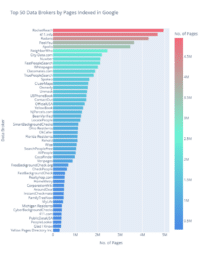📊🔍 Use this interactive chart to explore the Top 50 Biggest Data Brokers (ranked by number of pages indexed in Google).
Key Takeaways:
- RocketReach is number 1 in the Top 50 Biggest Data Brokers, with almost 5 million pages indexed in Google.
- Whitepages.com (one of the most well-known and oldest People Search Sites) is at 2.1 million pages.
- Many more Data Brokers have > 1 million pages – but unfortunately, if your info is exposed on these sites it remains a major privacy problem.
In this post:
- How we measured the Top 50 Biggest Data Brokers.
- Why People Search Sites care about page count (and you should too).
Next Steps:
- Check the Opt-Out Guides – Instructions to remove yourself from these sites.
- Sign Up for Free monitoring with Optery at 390 sites.
🦶 Measuring Data Brokers by their online footprint
The Data Broker industry is a billion dollar business, and it’s only getting bigger. Data brokers are companies that collect and sell personal information about consumers. In this post we’re looking at the Top 50 Biggest Data Brokers.
There are hundreds or even thousands of Data Brokers and People Search Sites. For consumers, learning about this shadowy marketplace can feel overwhelming. Awareness is a good first step and breaking things down by the numbers can help.
One way to measure Data Brokers is by looking at their footprint online.
🤔 Why does the number of web pages matter?
Data Brokers intentionally create a lot of pages and make sure they show up in Google, Bing, etc.
The reason is simple: they use Search Engines like Google to attract more traffic to their sites.
More pages equals more traffic equals more SALES (of your Personal Information).
The Top 50 Biggest Data Brokers are really good at this.
When a random person (or even a cybercriminal) searches for your name in a search engine, Data Brokers like whitepages.com will show up and they can say, “Hey, you want to know more about this person? Click here and we will sell you their address, phone number, net worth, and tons of other private information for a few dollars!”
Here is an example using “John Smith New York, NY”
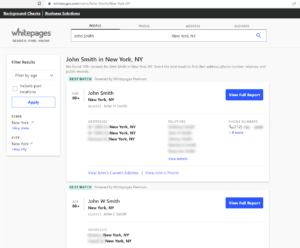
In the video below, CEO of Optery Lawrence Gentilello describes the history of Data Brokers using this technique to profit from our personal information:
…they would have MILLIONS of pages of content indexed in Google to draw more and more eyeballs and more and more clicks when people searched for people’s names on search engines. That became a very easy way to make money.
Maybe 20 years ago, that was just sort of a recipe for success. And you saw a proliferation of Data Brokers starting to publish people’s information online. It was legal, it was easy, and it was profitable.
The leader in this space was WhitePages.com. They took all of this information they published on the web and they rode the coattails of the SEO plus ads frenzy in the early 2000s.
🧮 How to count indexed pages in Google?
To find the number of pages Google has indexed for a site, use the site: modifier followed by the URL in Google Search.
For example, to limit Google Search results to pages on whitepages.com, you would search for site:whitepages.com. The number of matching results is displayed at the top of the results page.
In this example, Google has indexed 1.85MM pages on the whitepages.com domain.
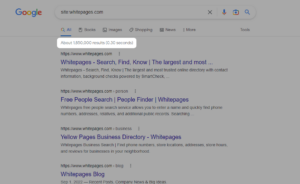
🤷 Data Broker sites are BIG. So what?
Data Brokers collect our data without our knowledge or consent.
This information can be used for “legitimate” marketing purposes. It can be sold to other companies or used to target ads. But it can also be bought by cybercriminals or sold to over-reaching government agencies.
The Top 50 Biggest Data Brokers are high-profile, but they’re not the only risky sites out there. All Data Brokers buy and sell our info. Read on for what they know about us, how they know it, and why it matters.
👁️ What do Data Brokers know about us?
There are many different types of data that Data Brokers collect, including but not limited to:
- Name
- Address
- Phone number
- Email address
- Birth date
- Social security number
- Financial information
- Medical records
- Shopping habits.
Some data brokers also collect sensitive information such as sexual orientation or political affiliation.
🗃️ Where did all of this information come from?
Most Data Brokers get their information from public sources such as voter registration rolls or property records. However, some Data Brokers also purchase information from private companies, such as banks or retailers. Data brokers may also collect information from social media platforms like Facebook and Twitter.
Once a Data Broker has compiled a consumer’s personal information, they typically put it into a database where it can be searchable by other companies. These databases are often sold or rented to other companies who use them for marketing purposes.
💰How do they use this information?
The most common way that Data Brokers use consumer information is for marketing purposes.
Companies will purchase lists of consumers from a Data Broker that meet certain criteria, such as being in a certain age range or having a particular income level. The company can then use this information to target its marketing efforts towards these consumers.
Here is an example from Acxiom showing consumer segments like income and life-stage:
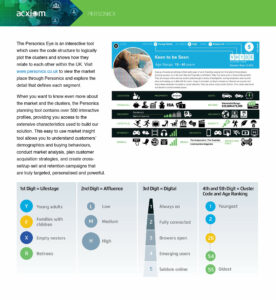
Data brokers may also sell consumer information to other companies, who may use it for any number of purposes. For example, a company could purchase a list of consumers from a Data Broker and then use this information to send unsolicited marketing emails or make sales calls.
😨 Why should I be concerned?
There are many reasons to be concerned about Data Brokers.
They have access to large amounts of data that can be used to target ads and sell products.
They also have the ability to track our online activity and even our offline activity.
This information can be used to influence our behavior and even manipulate our emotions.
Some Data Brokers have come under scrutiny for collecting sensitive information about consumers, such as their health conditions or financial history. This type of information is often sold to insurance companies or employers, who may use it to deny coverage or employment to individuals.
In some cases, Data Brokers have been known to sell consumer information to criminals who may use it for identity theft or fraud.
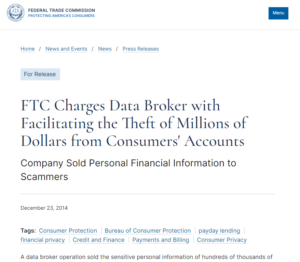
In another case, Data Brokers were caught selling the location history of people who visited abortion clinics.
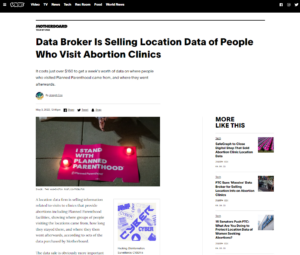
 Want to protect your information from Data Brokers?
Want to protect your information from Data Brokers?
There are hundreds of People Search Sites out there displaying peoples’ personal information. They are constantly changing and being updated. It’s nearly impossible to stay on top of these Data Brokers which is why we offer our premium service that monitors and removes your profile from dozens of Data Brokers continuously. We do all the work. You get your time back and more peace of mind. Bonus tip: if you’re a business owner worried about the security of your employees, we also have Optery for Business.
